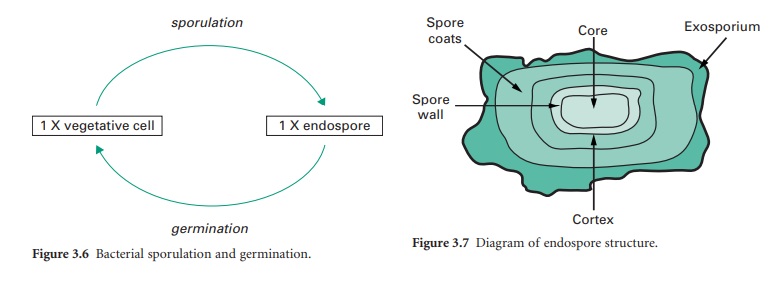Bacterial sporulation
| Home | | Pharmaceutical Microbiology | | Pharmaceutical Microbiology |Chapter: Pharmaceutical Microbiology : Bacteria
In a few bacterial genera, notably Bacillus and Clostridium, a unique process takes place in which the vegetative cell undergoes a profound biochemical change to give rise to a specialized structure called an endospore or spore..
BACTERIAL SPORULATION
In a few bacterial genera,
notably Bacillus and Clostridium, a unique process takes
place in which the vegetative cell undergoes a profound biochemical change to
give rise to a specialized structure called an endospore or spore (Figure 3.6).
This process of sporulation is not part of a reproductive cycle, but the spore
is a highly resistant cell that enables the producing organism to survive in
adverse environmental conditions such as lack of moisture or essential
nutrients, or exposure to toxic chemicals, radiation or high temperatures.
Because of their extreme resistance to radiation, ethylene oxide and heat, all
sterilization processes for pharmaceutical products have been designed to
destroy the bacterial spore . Removal of the environmental stress may lead to
germination of the spore back to the vegetative cell form.
Endospore structure
Endospores are
differentiated cells that possess a grossly different structure to that of the
parent vegetative cell in which they are formed. The structure of the spore is
much more complex than that of the vegetative cell in that it has many layers
surrounding a central core (Figure 3.7). The outermost layer is the exo-sporium
composed of protein; within this are the spore coats, which are also proteinaceous
but with a high cysteine content, the cortex that consists of loosely crosslinked
peptidoglycan and the central core that contains the genome. Characteristic of
the spore is the presence of dipicolinic acid and high levels of calcium ions
which complex together. The core is also partially dehydrated, containing only
10–30% of the water content of the vegetative cells. Dehydration has been shown
to increase resistance to both heat and chemicals. In addition, the pH of the
core is about 1 unit lower than the cytoplasm of the vegetative cell and contains
high levels of core-specific proteins that bind tightly to the DNA and protect
it from potential damage. These core-specific proteins also function as an
energy source for the outgrowth or germination of a new vegetative cell from
the endospore.

Endospore formation
During endospore
formation the vegetative cell undergoes a complex series of biochemical events
in cellular differentiation, and many genetically directed changes in the cell
that underpin the conversion occur in a series of distinct stages. Sporulation
requires that the synthesis of some proteins involved in vegetative cell
function cease and that specific spore proteins are made. This is accomplished
by activation of a variety of spore-specific genes such as spo and ssp. The proteins
coded by these genes catalyse a series of events leading ultimately to the production
of a dry, metabolically inert but extremely resistant endospore. The whole
process can take only a matter of hours to complete under optimal conditions.
Endospore germination
Although endospores can
lie dormant for decades, they can revert back to a vegetative cell very
rapidly. Activation of the process may occur through removal of the stress
inducer that initiated sporulation. During germination loss of resistance
properties occurs along with a loss of calcium dipicolinate and cortex
components, and degradation of the core-specific proteins. Outgrowth occurs,
involving water uptake and synthesis of new RNA, proteins and DNA until eventually,
after a matter of minutes, the vegetative cell emerges from the fractured spore
coat and begins to divide again.
Related Topics
